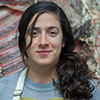



Stelle, Illinois (pop. 110), is an unincorporated village south of Chicago with a unique history—it was founded around 1970 by an early New Age author, Richard Kieninger, who led his followers from Rogers Park to build a self-sustainable community to survive the apocalypse. The apocalyptic part has long since faded away, but the self-sufficiency part remains. Harry Carr, 59, moved to Stelle in 1976. Today he owns two of the main businesses in Stelle, a frame factory and Mint Creek Farm, which sells organic meat and eggs to Chicago restaurants. He also writes poetry.
Interview and photos by Michael Gebert

My dad was an electrician, and my mom was the old-fashioned stay-at-home mom. But my mom, interestingly, subscribed to Organic Gardening magazine in the 60s, and I remember reading it and just being exposed to it on that level.
I was raised Baptist. But the cosmology of traditional fundamentalist Christianity just didn’t make a whole lot of sense to me. I used to have a lot of arguments with my mom. The fundamental problem that I see with Christianity is that it just hasn’t been a good steward of the planet. If you look at Western civilization and what we’ve done to the earth, kind of an underlying basis of that is this idea of man’s dominion over the planet. In other words, God gave man the ability to screw up the planet and live in its shit.
That’s not being Christian. Being Christian is being a good steward. But you don’t hear that.

When I was 16 I picked up the book that the founder of Stelle [New Age author Richard Kieninger, who led his followers from Rogers Park to build a self-sustainable community to survive the apocalypse] wrote, The Ultimate Frontier, off my sister’s bookshelf. And I read it nonstop, and really responded to a lot of the ideas in it. So I came out here when I was 20 to network with the people and see what trouble I could get into.

I had been trained in tool and die making, and I worked for a plastics company that a Stelle member started. When interest rates hit over 20 percent [in the late 1970s], those businesses suffered, and they had trouble making payroll. We were living on the $5 an hour my wife made as a nurse’s aide in Pontiac.
I started a couple of businesses, and in time they did quite well. I was riding my mountain bike back and forth to work at the other facility where my office was, that was five miles each way. And I kept getting sprayed by these big agricultural rigs. And that kind of brought me back to my time as a kid in organic gardening, and just feeling like hey, there’s another way that we can do this.
I started in 1992, bought our first 50 acres and started raising sheep. We branched into goats and cattle, pigs, and chickens gradually, after we started selling at farmers’ markets and through our CSA.
I had a friend that gave me ten of their culls. A cull is an animal where they determine that they don’t want to continue their genetics. So I got ten problems to start my sheep education. I didn’t know what I was doing. OK, now I’m a sheep farmer. Whatever. I don’t know if I was a good choice for the sheep, but they were a good choice for me.


With a monoculture like a conventional cornfield, the first thing you do is kill everything. It’s like man’s better than God, man’s better than nature. We’re going to start from ground zero. And then we’re going to give nature what it needs with our chemicals. The problem that this solves is harvest. You can design one machine to harvest corn, and you can grow a monoculture and harvest it. The problem with diversity and polycultures is, how do you harvest it? And that’s where the whole system of animals in agriculture comes in, because those cows do a great job where the combine completely fails.
So when they kill everything in the ground and they plant their monoculture seeds, they have the problem of nature wants to come in and add diversity. Well, that’s called weeds to the monoculture farmer. What a weed to me is, if the animal can eat it, it’s not a weed. If there’s nutrients in the plants, it’s not a weed. And that will reflect in the animal’s meat.

It’s kind of a complete system. There’s a tremendous wealth of fertility that comes from utilizing livestock that a farm that does not have animals is missing out on.
Chickens are wonderful out on the pasture with all the insects they eat. That’s another benefit to going more in the range of diversity. You encourage the insect population, and the birds can eat a lot of that protein.
The more that we can encourage the growth of insects, the very thing that monoculture farmers are spraying insecticides to kill, we’re doing the opposite and harvesting the insects with animals such as chickens.
I want to feed eggs to pigs. Eggs are very high in protein, and pigs love eggs. And chickens are relatively cheap to get started. So my combine is the chicken for the insects, and feeding the excess eggs to the pigs. I’m not there yet, because I keep selling out of eggs at the farmers’ markets. When you can get $6 a dozen for eggs, why would you feed them to pigs?
There are people that suggest that humans are going to be able to feed the planet with insects. That that’s what our future is. Well, I like eggs.






















